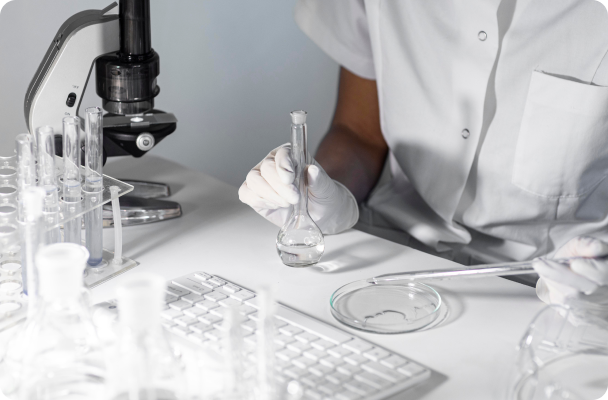Home › Biological sample › Infectious diseases › SARS-CoV-2
SARS-CoV-2-infected patients samples
For research applications
The development of drugs and diagnostic tests for the treatment and detection of SARS-CoV-2 requires conducting studies on biological samples obtained from patients infected with SARS-CoV-2.
Here's a brief overview of various infectious diseases caused by Sars-CoV-2 and how the service provided by Labtoo contributes to accelerating R&D projects in the pharmaceutical industry.


Are you looking for biological samples from patients with Covid-19?
What is SARS-CoV-2?
The SARS-CoV-2 coronavirus, known as COVID-19, is a single-stranded positive-sense RNA virus belonging to the family Coronaviridae, subfamily Coronavirinae. It emerged at the end of 2019 and quickly led to a global pandemic. Coronaviruses in this subfamily are characterized by their lipid envelope and surface spike proteins resembling a crown when viewed under an electron microscope.
This virus is concerning due to its high ability to spread among individuals and its potential for mortality, especially in certain patients.
The clinical manifestations of SARS-CoV-2 infection vary, ranging from asymptomatic cases to mild to severe respiratory symptoms such as fever, cough, and difficulty breathing. In some patients, particularly those with comorbidities, the infection can progress to severe pneumonia, acute respiratory failure, or even death.
Transmission of SARS-CoV-2 primarily occurs through respiratory droplets produced during coughing, sneezing, or even speaking, although airborne transmission is also possible in certain circumstances. Additionally, the virus can survive on various surfaces for hours to days, increasing its potential for spread.

Explore Labtoo's Service for Your Biological Sample Research
Labtoo assists you in sourcing biological samples from patients with COVID-19. Our team manages the entire project of transferring biological materials from inception to sample delivery.
- Feasibility assessment of sample availability or clinical collection from referenced clinical centers
- Validation of regulatory aspects
- Establishment of a contractual framework
- Dispatch of desired samples under appropriate conditions
- Transfer of associated clinical data
- Additional analytical and experimental services
Types of available samples
Nasopharyngeal swab
Nasopharyngeal swabs are crucial in the study of COVID-19 as they enable the detection of the virus, thus aiding in diagnosing infections and tracking the spread of the disease.
Saliva
Saliva samples are also essential in COVID-19 research as they provide a non-invasive method of sample collection, facilitating large-scale screening and enabling monitoring of the virus presence in the population in a more convenient and less intrusive manner.
Other
Other types of biological samples can be collected for studying COVID-19. Among them, samples of sputum or bronchoalveolar lavage fluid can be mentioned for patients with severe respiratory symptoms.
- Whole Blood: from patients with COVID-19
- PBMC (Peripheral Blood Mononuclear Cells)
- Plasma
- Serum
- Leukapheresis
- Fresh Tissues
- Frozen Tissues (OCT and FF)
- FFPE Tissues
Données cliniques associées typiques
-
- Age
- Sexe
- Classification TNM
- Traitement suivi
- Imagerie médicale
- Serologie HIV/HBV/HCV
- Mutations
- Autres

Notre service identifie les sites cliniques capables de préparer et de transférer une collection d'échantillons pour un projet donné.
Demandez à notre équipe de discuter de votre projet.
Votre projet
Symptoms of COVID-19 Infections
The symptoms associated with COVID-19 pathology exhibit variability in terms of severity. It is estimated that approximately half of individuals infected with the virus remain asymptomatic. Severe manifestations of the disease are primarily observed in individuals with comorbidity factors such as advanced age, obesity, immune disorders, hypertension, and diabetes, which are among the most prevalent.
The list of characteristic symptoms of COVID-19 includes the following:
-
Fever: An elevation in body temperature above 38°C, a common symptom in pathogenic infections.
-
Dry cough: A cough without production of mucus, irritating to the throat.
-
Fatigue: Pronounced fatigue and a sense of general weakness, often accompanied by muscle aches and soreness, are frequently observed in symptomatic individuals affected.
-
Shortness of breath or difficulty breathing: Patients may experience difficulty breathing during physical exertion. If this symptom persists, medical evaluation is recommended to prevent respiratory complications.
-
Loss of taste and smell: This symptom, specific to COVID-19, is not systematically present in all patients but has been reported in a significant number of cases. Additionally, this loss may persist for an extended period even after the resolution of virulence.
Diagnostic and treatment of COVID-19
To establish the presence of the SARS-CoV-2 virus in the body, several diagnostic methods are available:
Antigen tests
Although rapid, are not always reliable in detecting the infection.
PCR
Which is the reference method. It involves taking saliva or nasopharyngeal samples to detect the presence of specific genes of SARS-CoV-2.
Serological testing
Can be used to determine the presence of specific antibodies directed against the surface proteins of the virus. It should be noted that this test is not designed to diagnose the disease itself but rather to assess whether a person has been previously exposed to the virus and has developed an immune response.
For the majority of individuals not experiencing severe symptoms, treatment will rely solely on taking medications targeting fever and pain, such as paracetamol.
Individuals experiencing respiratory complications will be managed in a hospital to receive assisted oxygenation. Lastly, individuals with risk factors and thus at risk of developing severe forms may receive antiviral treatment.
Complications associated with COVID-19
Several complications have been identified in patients with COVID-19, including :
Severe pneumonia
A severe lung infection leading to acute respiratory distress syndrome (ARDS).
Neurological issues
Some patients experience neurological complications such as strokes, encephalopathies, or neuropathies during SARS-CoV-2 infection.
Kidney injuries
Kidney damage ranging from nephritis to kidney failure can occur.
"Long COVID"
Some patients suffer from persistent symptoms after the acute phase of infection, including persistent fatigue, respiratory issues, joint pain, and cognitive impairments, which can persist for months after the onset of infection.



